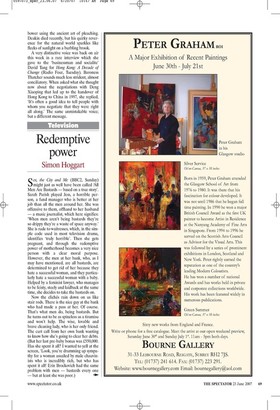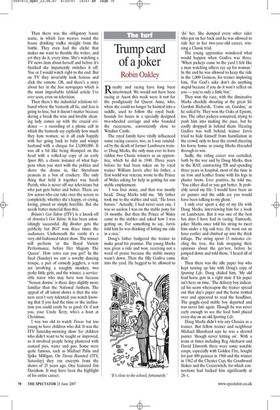Redemptive Power
Simon Hoggart Sex, the City and Me (BBC2, Sunday) might just as well have been called 'All Men Are Bastards — based on a true story'. Sarah Parish played Jess, a horrible person, a fund manager who is better at her job than all the men around her. She was offensive to them, offhand to her husband — a music journalist, which here signifies: 'When men aren't being bastards they're so drippy they're a waste of space anyway.' She is rude to waitresses, which, in the simple code used in most television drama, identifies 'truly horrible'. Then she gets pregnant, and through the redemptive power of motherhood becomes a very nice person with a clear moral purpose. However, the men at her bank, who, as I may have mentioned, are all bastards, are determined to get rid of her because they hate a successful woman, and they particularly hate a successful woman with a baby. Helped by a feminist lawyer, who manages to be feisty, steely and laidback at the same time, she decides to take the bastards on.
Now the clichés rain down on us like stair rods. There is the nice guy at the bank who had made a pass at her. Of course. That's what men do, being bastards. But he turns out to be as spineless as a tiramisu and won't help. The wise, lovable and brave cleaning lady, who is her only friend. The curt call from her own bank wanting to know how she's going to clear her debts. (But her last pre-baby bonus was £550,000. Has she spent it all? I wanted to yell at the screen, 'Look, you're drumming up sympathy for a woman assailed by male chauvinists who is incredibly rich, but who has spent it all! Erin Brockovich had the same problem with men — bastards every one — but at least she was poor.) Then there was the obligatory booze scene, in which Jess weaves round the house drinking vodka straight from the bottle. They even had the cliché that makes me want to throttle the writer, and yet they do it, every time. She's watching a TV news item about herself and before it's finished she impatiently switches it off. You or I would watch right to the end. But on TV they invariably look furious and click the remote. Oh, and there's a story about her in the Sun newspaper which is the most improbable tabloid article I've ever seen, even on television.
Then there's the industrial relations tribunal where the bastards all lie, and Jess is going to lose, but it doesn't matter because during a break the wise and lovable cleaning lady comes up with the crucial evidence — a recording of a phone call in which the bastards say explicitly how much they hate women, so it all ends happily with her going back to baby and wimpy husband with a cheque for £3,000,000. It was all a bit like being thumped on the head with a rolled-up copy of an early Spare Rib, a classic instance of what happens when you start with the politics and shove the drama in, like Styrofoam peanuts in a box of crockery. The only thing that held it together was Sarah Parish, who is never off our televisions but who just gets better and better. There are few actors who can take over the screen so completely, whether she's happy, or crying, loving, pissed or simply horrible. But she needs better material than this.
Britain's Got Talent (ITV) is a knock-off of America's Got Talent. It has been astonishingly successful. Big Brother gets the publicity but BGT won three times the audiences. Underneath the razzle it's a very old-fashioned talent show. The winner will perform 'at the Royal Variety Performance, before Her Majesty The Queen'. How retro can you get? In the final (Sunday) we saw a novelty dancing troupe, a pair of comedy jugglers, a vent act involving a naughty monkey, two perky little girls, and the winner, a serviceable tenor who may have won because `Nessun dorma' is these days slightly more familiar than the National Anthem. The appeal of all talent shows is that the winners aren't very talented; you watch knowing that if you had the time or the inclination you could easily be as good. Or if not you, your Uncle Terry, who's a hoot at Christmas.
I was too old to watch Tiswas but too young to have children who did. It was the ITV Saturday-morning show for children who didn't want to be taught or improved, so it involved people being plastered with custard pies, water and goo. Some were quite famous, such as Michael PalM and Spike Milligan. On Tiswas Reunited (ITV, Saturday) they ran excerpts from the shows of 25 years ago. One featured Jim Davidson. It may have been the highlight of his entire career.






























































 Previous page
Previous page